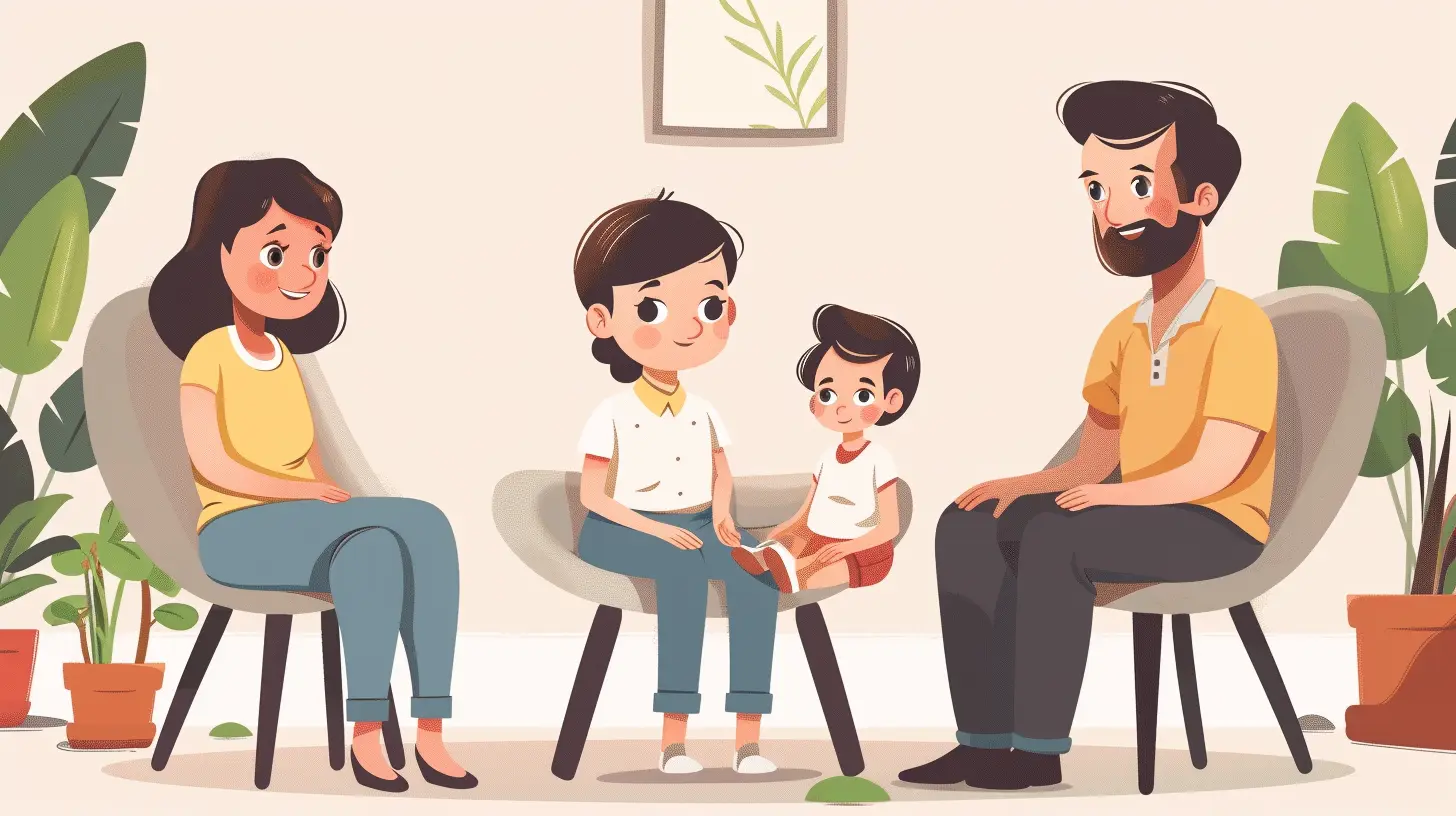Respectful Parenting: Treating Your Child as an Individual
28 December 2024
Parenting is one of life’s most rewarding yet challenging roles. As parents, we want to do our best, but let’s face it, there’s no one-size-fits-all manual for raising kids. One approach that’s been gaining traction—and for good reason—is respectful parenting. At its core, it’s about treating children as individuals, with their own thoughts, feelings, and boundaries. Sounds straightforward, right? But honestly, it’s not always as easy as it seems. Let’s break it down and see how this approach can transform your parenting journey.
What is Respectful Parenting?
Before we dive in, let’s start with the basics. Respectful parenting means treating your child the way you'd treat anyone you deeply care about—with kindness, understanding, and respect. Imagine how you’d interact with a close friend or a trusted colleague. You wouldn't ridicule their mistakes or ignore their feelings, would you? Then why should it be any different with your child?Children aren't mini versions of us; they’re whole individuals with their own emotions, experiences, and perspectives. Respectful parenting acknowledges this and emphasizes building a relationship based on trust and mutual understanding rather than control or fear.
Why Treating Your Child as an Individual Matters
Every child is unique—seriously, no two are the same. They come with their own set of talents, challenges, fears, and dreams. By recognizing them as individuals, we’re saying, "Hey, I see you, and I value who you are." This simple shift in mindset can have profound effects on your child’s development. Here’s why:1. Boosts Self-Esteem
Think about it—how would you feel if someone respected your choices and validated your feelings? Pretty great, right? When children feel valued, they develop confidence in who they are.
2. Builds Stronger Relationships
A respectful approach fosters trust. Instead of viewing you as an authority figure to fear, your child sees you as a safe space. This makes it easier for them to share their thoughts, feelings, and struggles.
3. Encourages Emotional Intelligence
When kids are treated with respect, they learn how to respect others. They become more empathetic and better equipped to navigate relationships as they grow.
4. Promotes Autonomy
By treating them as individuals, you empower your kids to make decisions, solve problems, and develop independence.
How to Practice Respectful Parenting
So, how do we actually practice respectful parenting? It’s not about parenting perfectly (because, let’s be real, none of us are perfect). Instead, it’s about small, consistent actions that show your child they matter. Let’s get into the nitty-gritty.1. Listen—Really Listen
When your kid is talking to you, give them your full attention. Put down your phone, turn away from the TV, and look them in the eye. Listening isn’t just about hearing words; it’s about understanding what’s behind those words.For example, when your child says, “I don’t want to go to soccer practice,” don’t immediately dismiss it. Ask why. Maybe they’re nervous about their performance, or they’re feeling left out. By listening, you’re showing them their voice matters.
2. Acknowledge Their Feelings
Ever been told to “calm down” when you’re upset? Frustrating, isn’t it? Kids feel the same way. Instead of brushing off their emotions, acknowledge them.If your child is crying because their tower of blocks fell over, resist the urge to say, “It’s just blocks.” Instead, try something like, “That must have been so frustrating. You worked so hard on it.” This simple validation goes a long way in helping kids feel seen and understood.
3. Set Boundaries with Empathy
Respectful parenting doesn’t mean letting your kid run wild. Boundaries are still important—it’s all about how you enforce them. Be firm but empathetic.Let’s say it's bedtime, and your child is begging for more screen time. Instead of snapping, “No, go to bed now,” try, “I know you want to keep watching, but it’s late, and your body needs rest. How about we watch more tomorrow?” This approach respects their desires while holding the line.
4. Model Respect
Want respectful kids? Be respectful yourself. Kids are sponges—they soak up everything they see. If you’re yelling, interrupting, or dismissing others, they’ll likely mimic that behavior.Treat your child the way you’d like them to treat others. Say “please” and “thank you.” Apologize when you mess up. Show compassion. These small actions teach big lessons.
5. Encourage Independence
One of the best ways to show respect is by trusting your child to make decisions. Of course, this doesn’t mean giving them free rein over everything (we’re not handing over the car keys to a 6-year-old). But for age-appropriate tasks? Let them take the lead.For instance, let your preschooler pick out their outfit—even if it’s mismatched. Allow your teenager to decide how they’ll spend their afternoon. These choices help them feel capable and respected.
6. Avoid Comparing Them to Others
Every parent has done it at some point, but comparisons can be damaging. Saying things like, “Why can’t you be more like your sister?” or “Your cousin got straight A’s; why didn’t you?” chips away at a child’s sense of self-worth.Instead, focus on their individual strengths and accomplishments. Celebrate their unique journey rather than measuring them against someone else’s.
Common Misconceptions about Respectful Parenting
Let’s clear up a few misconceptions because respectful parenting often gets a bad rap.1. It’s Not Permissive Parenting
Respectful parenting doesn’t mean letting your child do whatever they want. It’s about balance—respecting their individuality while still providing guidance and structure.
2. It’s Not About Being Perfect
You don’t have to get it right 100% of the time. There will be days when you lose your temper or make a mistake (welcome to being human). What matters is recognizing those moments and repairing the relationship afterward.
3. It’s Not “Soft” Parenting
Some people think being respectful means being weak. In reality, it takes strength to pause, empathize, and choose kindness—especially in the heat of the moment.
The Long-Term Benefits of Respectful Parenting
While it requires patience and effort, the long-term benefits of respectful parenting are well worth it. Here’s what you’re cultivating:- Resilient Adults: Children who grow up feeling respected often develop healthy coping mechanisms, self-confidence, and emotional intelligence.
- Stronger Family Bonds: Respect lays the foundation for a lasting parent-child relationship. Even as they grow older, your child will know they can turn to you without fear of judgment.
- A Kinder World: Teaching children respect isn’t just about them—it’s about creating a ripple effect. Respectful kids grow into respectful adults who contribute positively to society.
Final Thoughts
Respectful parenting isn’t about being a "perfect" parent or raising a "perfect" child (because, let’s face it, perfection is overrated). It's about showing up, day after day, and treating your child as the unique, incredible individual they are. It’s about listening, understanding, and building a relationship based on mutual respect.Yes, it takes work. Yes, you’ll mess up sometimes. But every small step you take toward treating your child with respect is a step toward raising confident, empathetic, and independent humans. And really, isn’t that the goal of parenting?
all images in this post were generated using AI tools
Category:
Parenting StylesAuthor:

Zelda Gill
Discussion
rate this article
14 comments
Asher Brown
Love this approach! Every child deserves respect and understanding.
February 14, 2025 at 5:15 PM

Zelda Gill
Thank you! I completely agree—respect and understanding are essential for nurturing a child's individuality.
Uriel Barnes
Respectful parenting is essential for nurturing a child's individuality. By treating them as unique individuals rather than just extensions of ourselves, we foster their confidence and autonomy. It's about listening, valuing their feelings, and encouraging their growth in a supportive environment.
February 1, 2025 at 5:44 PM

Zelda Gill
Thank you for highlighting the importance of respectful parenting! Valuing a child's individuality truly lays the foundation for their confidence and growth.
Zevran McKibben
Oh sure, because toddlers totally understand and love being treated like adults!
January 28, 2025 at 5:01 PM

Zelda Gill
Respectful parenting acknowledges toddlers' individuality while recognizing their developmental needs. It's about fostering understanding and connection, not adultification.
Chase McCracken
Respectful parenting fosters a strong bond by recognizing each child as a unique individual. This approach not only builds trust but also encourages self-esteem, independence, and genuine communication as they grow.
January 24, 2025 at 3:52 AM

Zelda Gill
Thank you for highlighting the essence of respectful parenting! Recognizing each child's uniqueness truly lays the foundation for a strong and trusting relationship.
Tiffany McCool
Parenting is like gardening—water the roots, not the weeds! 🌱 Treating your child as an individual means nurturing their unique quirks, like a sunflower who wants to dance with the daisies. Let's celebrate their individuality while we all grow together!" 🌼
January 20, 2025 at 4:39 AM

Zelda Gill
Absolutely! Embracing each child's uniqueness fosters a nurturing environment where they can thrive and flourish. 🌻
Vienna McIlroy
This article beautifully highlights the importance of treating children as individuals. Respectful parenting fosters mutual understanding and nurtures a child's unique identity. By listening actively and encouraging independence, we empower our children to thrive. Thank you for sharing such valuable insights on fostering respectful relationships!
January 16, 2025 at 5:11 PM

Zelda Gill
Thank you for your thoughtful comment! I'm glad you found the insights on respectful parenting valuable. Empowering children as individuals is essential for their growth and development.
Issac McAlister
Embrace their uniqueness; fostering individuality nurtures confidence and strengthens your parent-child bond.
January 10, 2025 at 3:22 PM

Zelda Gill
Absolutely! Celebrating individuality not only boosts a child's confidence but also deepens the connection between parent and child.
Seraphine McVicar
Respectful parenting fosters a child's individuality by recognizing their unique thoughts and feelings. This approach strengthens communication, builds trust, and creates a supportive environment for emotional growth and independence.
January 7, 2025 at 4:23 AM

Zelda Gill
Thank you for highlighting the importance of recognizing each child's unique perspectives. Respectful parenting truly lays the foundation for their emotional growth and independence.
Ashley Barnes
Respectful parenting? More like 'watching my mini-me take charge!' It’s a wild ride treating kids as individuals. Spoiler: They’re not just tiny adults but unpredictable little aliens with their own agendas. Buckle up, folks! If you think you’re in control, just wait until they discover their own opinions!
January 4, 2025 at 4:50 AM

Zelda Gill
Absolutely! Parenting is indeed a wild ride. Embracing their individuality can be challenging, but it fosters growth and understanding for both parent and child. Buckle up for the unpredictable journey!
Henrietta Cox
Respectful parenting empowers children by honoring their individuality, fostering confidence and mutual respect, creating a strong foundation for healthy relationships.
January 1, 2025 at 5:48 AM

Zelda Gill
Thank you for your insightful comment! I completely agree—honoring a child's individuality is essential for fostering confidence and building meaningful, respectful relationships.
Alexander Frye
What a wonderful perspective! Acknowledging our children as individuals fosters their confidence and independence. Your insights on respectful parenting are a valuable reminder of how important it is to nurture their unique identities. Keep inspiring!
December 30, 2024 at 4:21 AM

Zelda Gill
Thank you so much for your kind words! I truly believe that recognizing our children's individuality is key to their growth and confidence. I'm glad you found the insights valuable!
Violet McQuiston
Respectful parenting fosters a child's individuality and confidence. By actively listening and valuing their opinions, we empower them to express themselves and develop strong, healthy relationships. Every voice matters!
December 29, 2024 at 4:56 PM

Zelda Gill
Thank you for your insightful comment! I completely agree—respectful parenting not only nurtures individuality but also builds confidence and healthier relationships. Every child's voice is indeed invaluable!
Kira McKeehan
In respectful parenting, recognizing your child as an individual fosters their unique identity and encourages self-expression. By valuing their thoughts and feelings, we nurture their confidence and emotional intelligence. Remember, listening and understanding pave the way for trust, forming the foundation of a healthy parent-child relationship.
December 29, 2024 at 3:27 AM

Zelda Gill
Thank you for emphasizing the importance of individuality in respectful parenting. Valuing our children's thoughts and feelings is indeed crucial for building their confidence and fostering a trusting relationship.
Henrietta McConnell
Respectful parenting fosters a strong bond between parent and child. By recognizing their individuality, we empower them to express themselves, build confidence, and develop critical thinking skills that will serve them for life.
December 28, 2024 at 5:16 AM

Zelda Gill
Thank you for your insightful comment! I wholeheartedly agree that recognizing a child's individuality is key to fostering a strong, respectful bond that promotes their confidence and critical thinking skills.
MORE POSTS

Encouraging Curiosity and Creativity in Your Teen

Setting a Good Example: What Your Teen Learns from You

Empowering Girls: Raising Confident and Fearless Daughters

Flexible Work Arrangements: What Working Moms Need to Know

Why Overprotecting Kids Can Hurt Their Confidence

The Power of Saying “No” as a Mom

The Funniest Things Kids Say and Why You Should Write Them Down

Raising Confident and Responsible Kids Through Democratic Parenting

Field Trips as Educational Tools: Making the World Your Classroom